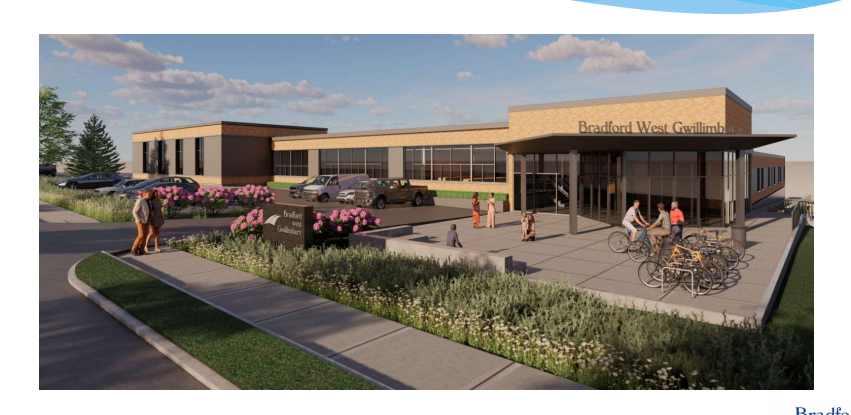The cost to build the new community hub at 177 Church St. has ballooned almost 50 per cent.
Bradford West Gwillimbury council approved an additional $3,595,844 in funding for the project during a special meeting Tuesday night, awarding the tender to Domm Construction of Ayton, who was the contractor for the new fire hall on Melbourne Drive.
Last June, council authorized staff to go to tender with a budget of $6.7 million. Domm’s bid, which staff called “the strongest proposal with the lowest price,” came in at $8,538,172, including HST. That price excludes previously committed funds for engineering, architecture and permits, as well as the 20 per cent contingency for the project.
Staff relied on tools used in previous major projects – such as the new fire hall – to develop its estimate for the community hub. As for why the cost increased so dramatically, staff can only look backward at the previous two years.
“We knew that we were going to see something; the industry was going to show us,” said Terry Foran, director of community services. “We didn’t know what it was going to be or how high it was going to be. We proceeded with the method that we knew, with the numbers that we knew, because trying to predict what the past couple of years was going to do to us was very hard.”
Staff had to sit back and watch as they saw other municipalities bring large projects to tender that exceeded their estimates. Foran added that both contractors that made it to the second phase of the tender process explained their costs had increased by as much as 20 per cent in the first two months of 2022 alone.
While the estimate reflects the realities of the past two years, Foran stressed both bids that were submitted were competitive, just greater than what the town expected. For the time being, it’s an increase bound to be borne in part by the ratepayers of the municipality.
The additional construction costs will translate to more money being required from the tax levy. The original estimate included net expenditures in the neighbourhood of $720,000, equating to a 3.2 per cent increase. With the tendered amount, those expenditures increase to almost $870,000, or a 3.87 per cent jump in taxes.
That was tough for Coun. Peter Dykie to swallow.
“My biggest concern is the impact to the overall taxpayer. That really worries me,” he said. “I’m not in favour to put this on the back of taxpayers … We have so many projects necessary moving forward: roads, sewage treatment plants, the whole nine yards. I would just hope that we can come up with a better way to finance.”
He lamented the lack of support from the federal government on the project, and that there has yet to be any sort of fundraising initiative started or commitment from the business community to help bring the community hub to fruition.
The federal government received the town’s grant application nearly nine months ago. Any fundraising to help alleviate the cost of the community hub is on hold until a decision on the grant is made.
If the grant is unsuccessful, Mayor Rob Keffer said, the town will look to businesses and fundraising for contributions.
Coun. Gary Lamb also voiced concerns about the detriment to the ratepayers, especially as that cost helps to subsidize the rent paid by “legacy” tenants who may not even have been paying rent in their previous location.
The community hub will be a building that eats taxes instead of paying them, Lamb said.
But delaying the project any longer – with costs that will likely keep rising, on land that is only increasing in value – wasn’t an option for council.
“In the end, the value in that building and that location is still worth moving forward on this project,” Deputy Mayor James Leduc said. “When we get this done, it’s a complete renovation back to the bricks and mortar of the building. We’re going to have a brand-new building, basically, for about $10 million.”
